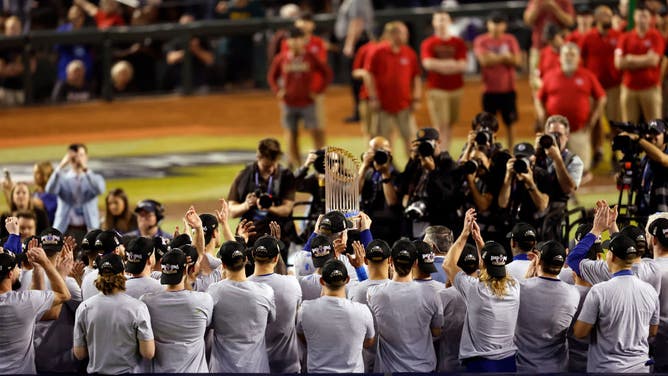What Can We Learn From The Rangers’ World Series Win?
The Texas Rangers are the champions of baseball after finishing off a dominant, 4-1 World Series win on Wednesday.
Behind starter Nathan Eovaldi and a 9th inning run-scoring surge, the Rangers locked down a 5-0 win in Game 5 to close out the series. Immediately, the baseball calendar turns to free agency, with teams now given an exclusive negotiating window before top players can hit the open market.
READ: IT’S OFFICIALLY THE MLB OFFSEASON, SO WHO ARE THE TOP FREE AGENTS AND WHERE WILL THEY SIGN?
As teams consider adding to their roster via trades or expensive free agents, some may consider if there are any lessons to learn from the Rangers roster as to what might work in the playoffs. And there's a pretty clear answer.
Absolutely nothing.
When the Kansas City Royals won the World Series in 2015, the narrative around the sport immediately became that having a dominant bullpen was key to postseason success. Youth and speed were thought to be important in the following years, as was starting pitching. Being aggressive at the trade deadline was also viewed as a harbinger of things to come. The 2017 Astros for example, traded for Justin Verlander to bolster their rotation. Little did anyone know the other methods they used to win. Meanwhile the 2022 Astros rode Yordan Alvarez to a title, seeming to show that clutch hitting was a necessity.
But the Rangers win shows there's essentially no one formula, no magic bullet acquisition, no one-size-fits-all explanation. It's all about luck.

PHOENIX - NOVEMBER 01: Members of the Texas Rangers celebrate during the Commissioner's Trophy presentation after the Texas Rangers defeated the Arizona Diamondbacks 5-0 in Game 5 of the 2023 World Series at Chase Field. (Photo by Chris Coduto/MLB Photos via Getty Images)
World Series Wins Aren't Predictable
The Rangers tried to follow most of the playoff narrative formulas. They signed Jacob deGrom in the 2022-23 offseason. There's your dominant starting pitching.
After deGrom went down with an injury, they were aggressive at the trade deadline, bringing in Aroldis Chapman, Max Scherzer and Jordan Montgomery. Chapman though was much worse in Texas in the regular season and allowed 15 baserunners in eight postseason innings. A ludicrously lucky 95% strand rate saved him from being one of the postseason's worst pitchers.
Scherzer barely pitched, returning from injury in time to allow seven earned runs in just 9.2 innings in October. Montgomery was excellent, but far from a dominant bullpen or dominant starters, the Rangers blew leads late in games and relied on generally mediocre starters.
Corey Seager won his second World Series MVP award, which would seem to fulfill the "clutch" hitting narrative. The Rangers knew he'd be "clutch," because he'd been that way for the Dodgers, right?
Not exactly.
Seager was excellent in the 2020 playoffs, yes, but prior to 2020 was 24 for 118 in October, a .203 batting average. In 2021, the year after his postseason tear, he hit .188. If Seager is so obviously clutch, why was he so bad in October for so long, then great, then terrible, then great again?
So Why Did Texas Win?
The Rangers won, simply, because they were a good team that had enough of the breaks go their way. Not because of Bruce Bochy, despite baseball media attempting to credit him for game saving and game winning home runs in Game 1.
The Diamondbacks during Game 5 were 0-9 with runners in scoring position. It's hard to score when you don't hit in key situations.
Texas also went 11-0 on the road, something that's never happened before in October. There's nothing special about the Rangers that makes them play better away from home; in fact, they were 40-41 on the road this regular season.
Playoff success comes down to having a good team and hoping the breaks go your way. That your best hitters get hot at the right time, like Marcus Semien hitting big home runs late in the World Series. Or that previously unexceptional pitchers get hot at the right time, like Jordan Montgomery and Nate Eovaldi.
There's no formula to take away from this year's champion, just more confirmation that the playoffs are mostly random. That certainly doesn't make it any less meaningful for the Rangers and their fans though.